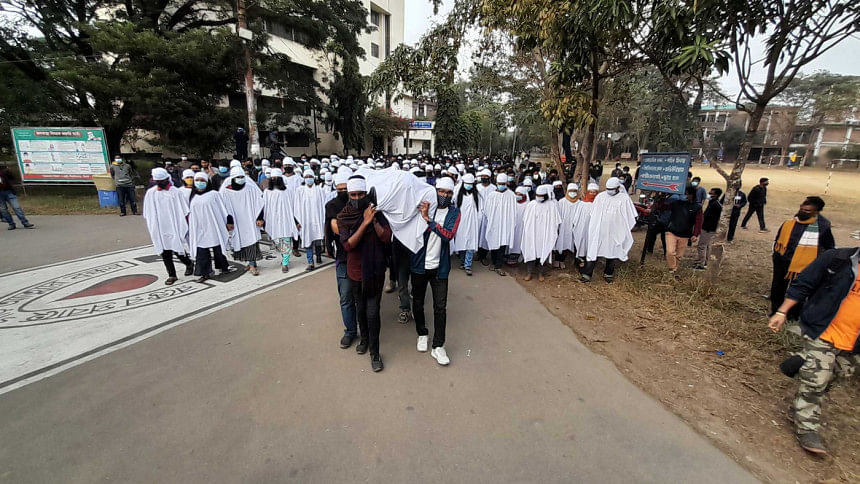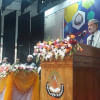SUST VC’s sexist remark reveals a worrying picture

Universities are considered to be the highest place for education, learning, research, and innovation. Students attend universities not only to get academic degrees, but also to acquire knowledge and develop a global outlook, which guide them throughout their lives. Seeds of education and values which are planted among students in school grow and mature at university. University education enhances and enriches individuals and societies, and university teachers play the key role in imparting education and shaping the minds of students by instilling the right values which are conducive to economic, political, social and cultural transformation.
It is, thus, incomprehensible that a university teacher—a VC, no less—could make a misogynistic remark such as the one made against the female students of Jahangirnagar University (JU). Instead of handling the demand by female students of Sylhet Shahjalal University of Science and Technology (SUST) to improve the situation at their dormitory in a sensitive manner, the VC attempted to undermine the issue by referring to the female students of JU and their movement around the campus at night in a derogatory and deplorable manner. He told the SUST students, "Do you want to be like the JU students whom nobody wants to marry, because they roam around at night?" Really? Who told him? He said that some student leaders told him so. He went on to say that he did not want their (SUST) "good" students to have such a "stain" on them.
Such remarks about university students and also women in general are not uncommon in our society. Even after several decades of women's leadership at the highest level of the country during its 50-year journey, the mindset of many people—men and women both—has hardly changed. A section of society, including its educated class, still tries to blame the victim when any abusive incident happens. In doing so, they justify abusive male behaviour towards women. I don't see any difference between them and the SUST VC, who is not only supposed to hold progressive values, but also contribute towards developing a progressive society where men and women would be valued equally. His conventional mental framework also sees women's education as mere preparation for marriage, rather than a means for their own development. And in his typical perception, "good girls" are those who would abide by female-specific rules. By making such a remark about students of a reputed university, he has not only insulted the female students, but also the teachers who are in charge of educating students and maintaining a congenial environment on the JU campus. He has also insulted the parents and guardians of the JU female students. As such, he must apologise for his indecent and inappropriate remark.
The second issue is the SUST VC's style of crisis management, which is dependent on the ruling party's student wing and the law enforcement agencies. The ongoing crisis at SUST, which could have been easily avoided, has once again brought to the fore the issue of VC selection. The culture of rewarding people who are loyal to the ruling party has engulfed almost all sectors—including the universities which are supposed to be the lively centres of independent and liberal thoughts.
A university VC used to be a highly regarded position once upon a time. Sadly, it seems nowadays that there is a deliberate attempt to appoint teachers with poor educational and professional accomplishments but with strong political connections. Their academic background, experience and administrative capabilities are not counted for the position. In the SUST VC's case, social media has been flooded with comments by his own students regarding his basic understanding of the subject and his teaching quality.
And after their appointment, it is not their performance as an administrator or educationist, but their subservient behaviour that is counted for their job security. As a result, they cannot make decisions on their own and even depend on student political leaders. Student politics is supposed to solve students' problems, not to make administrative decisions. But in many cases, there is a nexus between such student leaders and university VCs. They engage in financial and other irregularities together. Political backing saves them even after corruption is proven. Such moral degradation among the VCs and the deterioration of the dignity of the position discourages qualified teachers to run for the position.
There are student unions in developed countries as well. Like many, I have experienced first-hand at two top universities in the UK and the US how student unions function, and how they enhance student welfare by engaging with the university administration. Even with so much freedom, students cannot think of misbehaving with teachers. Indeed, the strong institutional foundation of these universities, which is based on the principles of quality, integrity and independence, keep those unions functioning smoothly. Because they diligently uphold such core values, educational institutions in the advanced and many developing countries have not only been surviving, but thriving for long.
Dr Fahmida Khatun is executive director at the Centre for Policy Dialogue (CPD). Views expressed in this article are the author's own.

 For all latest news, follow The Daily Star's Google News channel.
For all latest news, follow The Daily Star's Google News channel. 








Comments